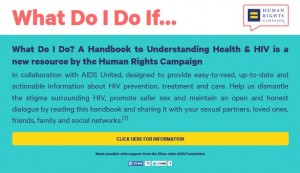 WASHINGTON – Today, just hours after Grammy Award-winning music legend Elton John urged Congress to bolster its fight against AIDS, the Human Rights Campaign (HRC) Foundation, in collaboration with AIDS United, released a guide on HIV prevention and care, as well as a unique online Q&A feature. This new resource is supported in part by a grant from the Elton John AIDS Foundation.
WASHINGTON – Today, just hours after Grammy Award-winning music legend Elton John urged Congress to bolster its fight against AIDS, the Human Rights Campaign (HRC) Foundation, in collaboration with AIDS United, released a guide on HIV prevention and care, as well as a unique online Q&A feature. This new resource is supported in part by a grant from the Elton John AIDS Foundation.
The guide, “A Handbook To Understanding Health and HIV,” lays out facts and debunks myths about HIV and AIDS at a time when 1.2 million people in the U.S. are living with HIV, and there are still 50,000 new diagnoses annually. It is being released at a time when, as Elton John noted in his testimony today before a Senate appropriations subcommittee, sustained efforts are needed to prevent the disease from once again becoming a “ruthless pandemic.”
“It can be confusing, and in some cases downright overwhelming, to navigate issues related to HIV and AIDS by yourself – especially if you’re a young person who is still coming to terms with your sexual orientation or gender identity,” said Jay Brown, HRC Director of Research and Public Education. “We created this handbook to help make that process a little easier.”
“Whether you’re a young, Black gay man in the city of Atlanta, or a transgender woman living in rural Mississippi, you deserve access to sexual health information that is accurate and affirming of who you are,” said Brown of the HRC Foundation, the educational arm of the the nation’s largest lesbian, gay, bisexual, and transgender (LGBT) civil rights organization .
The reality remains that, while the LGBT community continues to make extraordinary strides in equality, we are still facing staggering rates of HIV in the U.S. — driven largely by misinformation, stigma and societal barriers to information and care, including discrimination and poverty.
- Roughly one in seven people in the U.S. do not know their HIV status;
- One in four of new HIV infections are occurring among young people between the ages of 13 and 24;
- Gay and bisexual men and transgender women of color continue to bear the biggest HIV burden.
“It’s time for our communities, one and all, to commit to knowing our HIV status, to seeking treatment when positive, and, if negative, to use the tools available to stay that way,” said Michael Kaplan, president and CEO of AIDS United. “Thank you HRC for helping to put HIV back in the community spotlight.”
The online version of the plain-language handbook offers a “What Do I Do If….” feature that allows users to click on topics ranging from “What do I do if…I don’t know anything about HIV,” to “What Do I Do If…my partner has HIV?” The feature also includes information about what to do if people believe they’ve been discriminated against because they have HIV; how and whether to disclose HIV status; and where to turn for more details on using, with a physician’s guidance, pre-exposure prophylaxis (PrEP).
The four-part handbook, hailed by many in the HIV and AIDS clinical and advocacy community as an invaluable resource, provides an overview of HIV and how it’s transmitted; information on testing and the importance of knowing your status; what an HIV test result means and what to expect; and guidance on prioritizing positive, shame-free sexual health.
HRC will distribute the pocket-sized guidebook this summer at LGBT Pride festivals across the country, including in cities where rates of new HIV infection remain alarmingly high. It will also be made available to medical providers, youth-serving professionals, and community-based organizations serving the LGBT community. A Spanish-language edition is forthcoming.











